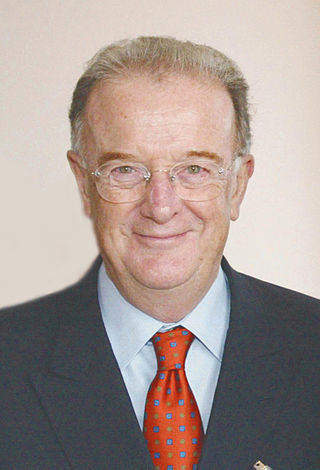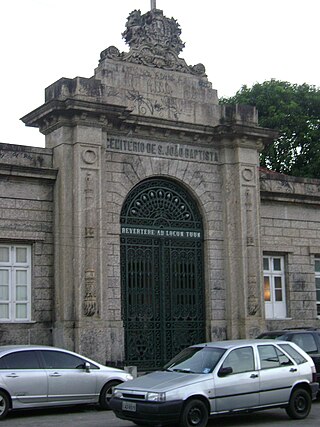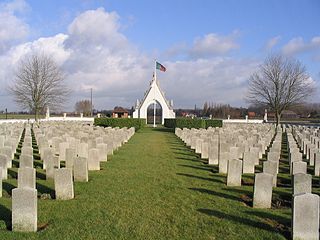These lists of cemeteries compile notable cemeteries, mausolea, and other places people are buried worldwide. Reasons for notability include their design, their history, and their interments.

Jorge Fernando Branco de Sampaio was a Portuguese lawyer and politician who was the 18th president of Portugal from 1996 to 2006. A member of the Socialist Party, a party which he led between 1989 and 1992, he was the mayor of Lisbon from 1990 to 1995 and High-Representative for the Alliance of Civilizations between 2007 and 2013.

The Socialist Party is a social-democratic political party in Portugal. It was founded on 19 April 1973 in the German city of Bad Münstereifel by militants who were at the time with the Portuguese Socialist Action. The PS is a member of the Socialist International, Progressive Alliance and Party of European Socialists, and has nine members in the European Parliament within the Progressive Alliance of Socialists and Democrats group during the 9th European Parliament. It has been the governing party of Portugal since the 2022 legislative election.

Cemitério de São João Batista is a municipal necropolis originally owned and operated by the Santa Casa da Misericórdia do Rio de Janeiro, and run, since August 2014, by the private company Rio Pax.

Augusto César de Almeida de Vasconcelos Correia, GCSE, better known as Augusto de Vasconcelos was a Portuguese surgeon, politician and diplomat, who served as 57th Prime Minister of Portugal.
Jorge Torlades O'Neill, was the titular and official head of the Clanaboy O'Neill dynasty, whose family has been in Portugal since the 18th century.
José Maria O'Neill, was the titular head of a branch of the Clanaboy O'Neill dynasty, whose family has been in Portugal since the 18th century.
Events in the year 2001 in Portugal.

The 2016 Portuguese presidential election was held on 24 January. This election chose the successor to the President Aníbal Cavaco Silva, who was constitutionally not allowed to run for a third consecutive term.
The 2014 Prémio Autores was the fifth edition of the Prémio Autores. It took place on 8 May 2014 at the Salão Nobre dos Paços do Concelho of the Câmara Municipal of Lisbon, Portugal.

Emmanuel Jean-Michel Frédéric Macron is a French politician serving as the 25th and current president of France since 2017. Ex officio, he is also one of the two Co-Princes of Andorra. Earlier, he served as the Minister of Economics, Industry and Digital Affairs under President François Hollande from 2014 to 2016 and Deputy Secretary-General to the President from 2012 to 2014.
First Lady of Portugal is the unofficial title attributed to the wife or Partner of the president of Portugal. To date, there has been no first gentleman of Portugal. The current First Lady is Rita Amaral Cabral, Partner of president Marcelo Rebelo de Sousa.

Renaissance (RE) is a liberal and centrist political party in France. The party was originally known as En Marche ! and later La République En Marche ! before adopting its current name in September 2022.
The Cemetery of Prado do Repouso is a cemetery in the civil parish of Bonfim, in the Portuguese northern, municipality of Porto.

João Lucas de Almeida Carvalho, known as João Lucas, is a Brazilian footballer who currently plays as a right back for Santos.

Éramos Seis is a Brazilian telenovela produced and broadcast by TV Globo. It premiered on 30 September 2019, replacing Órfãos da Terra, and ended on 27 March 2020. It is based on the book of the same name written by Maria José Dupré. The series is adapted by Ângela Chaves, with the collaboration of Bernardo Guilherme, Daisy Chaves and Juliana Peres.

João Augusto Ferreira de Almeida was a soldier in the Portuguese Expeditionary Corps of the First World War. After six months of combat, he was convicted of desertion by a court martial and executed by firing squad.
Alto de São João Cemetery is the largest cemetery in Lisbon, Portugal, located in the freguesia of Penha de França, in eastern Lisbon.

The Tomb of the Unknown Soldier holds an unidentified member of the French armed forces killed during the First World War, to symbolically commemorate all soldiers who have died for France throughout history. It was installed in Paris under the Arc de Triomphe on 11 November 1920, simultaneously with the interment of a British unknown soldier in Westminster Abbey, making both graves the first examples of a tomb of the Unknown Soldier, and the first to honour the unknown dead of the First World War.











